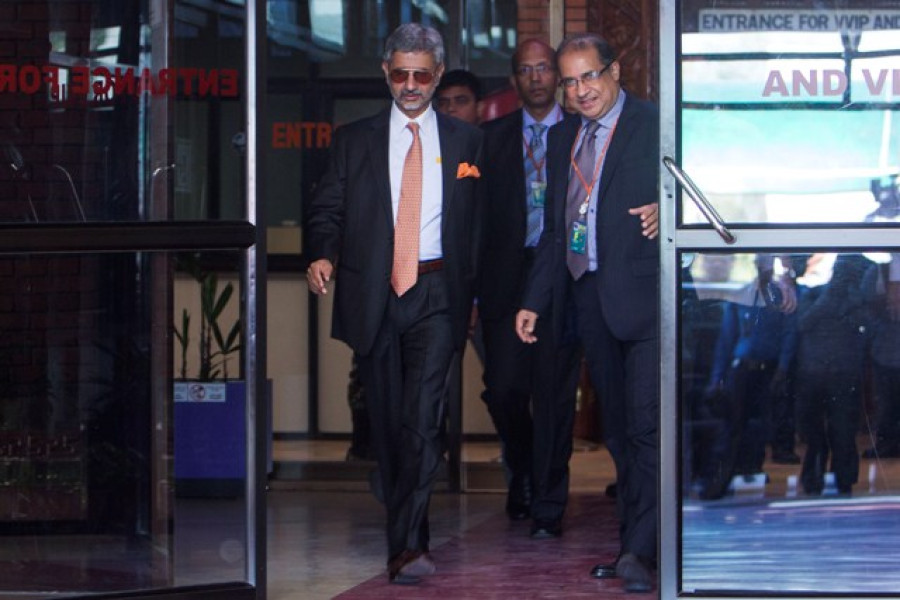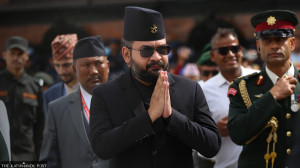Miscellaneous
‘Utilise time before statute promulgation’
Indian Foreign Secretary S Jaishankar, who arrived in Kathmandu on Friday as a special envoy of Indian Prime Minister Narendra Modi, held extensive meetings with key Nepali leaders in an effort to persuade them for ‘widest possible agreement’ on new constitution.
Indian Foreign Secretary S Jaishankar, who arrived in Kathmandu on Friday as a special envoy of Indian Prime Minister Narendra Modi, held extensive meetings with key Nepali leaders in an effort to persuade them for ‘widest possible agreement’ on new constitution.
Urging leaders of the three parties to bring disgruntled Madhes-based parties and Tharus on board before promulgating the new constitution, Jaishankar suggested that the window until the promulgation of new constitution be used effectively to push for its wider acceptance. India remains concerned by the lack of broad ownership of the current draft and by ongoing protest in Tarai region that borders India. India remains worried about spillover effect of protests in Tarai
India has sent a consistent message throughout the current constitution drafting process: ensure widest possible agreement on constitution for peace and stability in the country. In his separate meetings with President Ram Baran Yadav, Prime Minister Sushil Koirala and CPN-UML Chairman KP Sharma Oli, UCPN (Maoist) Chairman Pushpa Kamal Dahal and heads of Madhes-based parties, Secretary Jaishankar stressed the importance of incorporating disgruntled voices while completing a historic task of constitution writing process.
Immediately after arriving in Nepal, Jaishankar held two-hour discussion with CPN-UML Chairman KP Sharma Oli, leading prime ministerial contender. Jaishankar recommended that the UML leadership take all disgruntled groups into confidence on constitution.
Oli said their calls for talks went unheeded and that beyond a point they could not delay the constitution process. “We have not stopped reaching out to the disgruntled parties. More parties will join us before promulgating new constitution,” Oli assured Jaishankar, according to UML Chief Whip Agni Kharel, who was present in the meeting. “‘Genuine concerns’ of the disgruntled groups will be addressed even after the promulgation of the constitution.” Stating the process was internal affairs of Nepal, Oli urged Jaishankar for India’s support in completing Nepal’s historic task. In his response, Jaishankar clarified that India is only offering suggestions as an immediate neighbour.
Following the meeting with Oli, Jaishankar had a lunch meeting with Samyukta Loktantrik Madhesi Morcha, an alliance of four Madhesi parties, that has been protesting in the southern plains.
During the meeting, the Madhesi leaders urged for India’s support, while briefing Jaishankar on the protest in Tarai and state’s response.
Laxman Lal Karna, a leader of the front, said Madhesi leaders had collectively informed about ‘widespread oppression of the ongoing protest centered in Madhes’. “We put forth our differences with major parties regarding the draft Constitution.
We clarified that we will continue our protest against the constitution as it curtails rights of Madhesi people,” said Karna.
In his meeting with UCPN (Maoist) Chairman Pushpa Kamal Dahal, Jaishankar had said that the protest in Tarai had security implications for India.
In response, Dahal urged him to look at the interest of India as a whole. The Maoist chairman also expressed his concern over the timing of Jaishankar’s visit as special envoy. “It should have been either prior to the endorsement of the constitution bill or on the day of promulgation,” Dahal was quoted as saying by an aide. “On Madhes, we as Nepalis are more concerned than India.”
Prime Minister Sushil Koirala told Jaishankar that the parties are trying to accommodate Madhesi concerns. “But no one should say it is my way or highway,” an aide quoted Koirala as saying. “We are trying to find a win-win solution.”
A statement issued by Prime Minister’s Office said that Prime Minister Koirala expressed his gratitude to Indian Prime Minister Narendra Modi for attaching such significance to relations with Nepal and dispatching a special envoy. Jaishankar said India wished to see a sustainable peace, stability and development in Nepal and that the constitution have to be based on these goals, the PMO statement added.
Before meeting PM Koirala, Secretary Jaishankar met President Ram Baran Yadav and reiterated India’s concerns. President Yadav’s Press Advisor Rajendra Dahal said the meeting was “purely a courtesy call.”




 20.12°C Kathmandu
20.12°C Kathmandu









